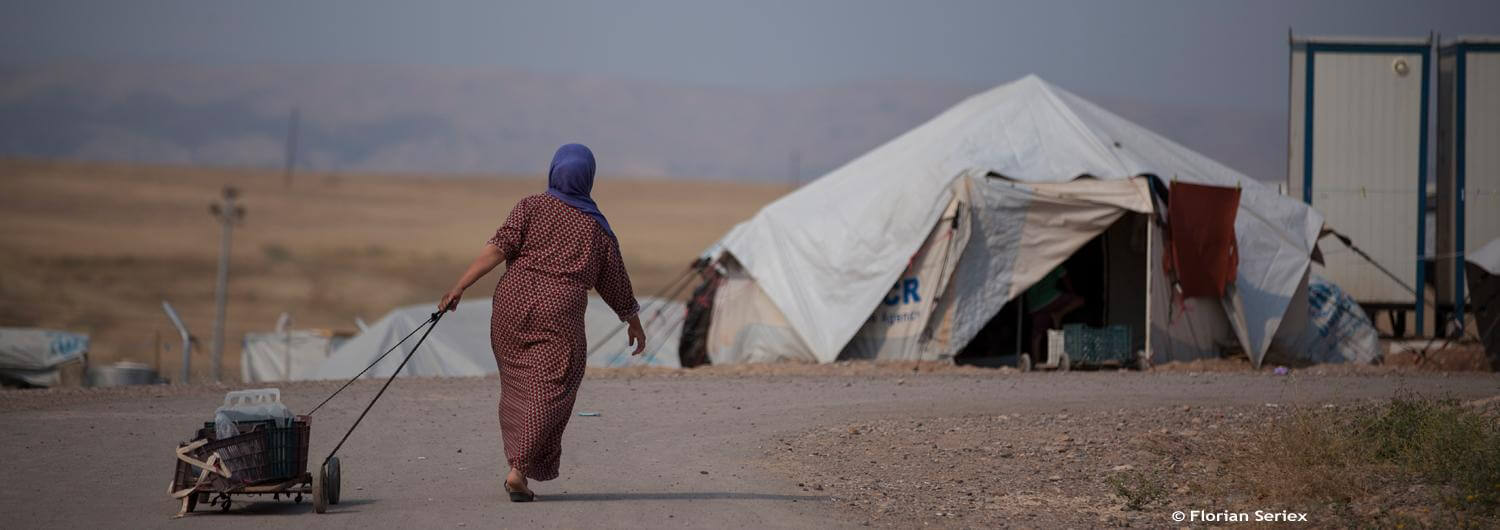News
Summer brings new woes for families in Iraqi Kurdistan
28/05/15

During the past year, worsening violence in Iraq has seen at least two million people forced to leave their homes.
any have headed to the Kurdistan region of Iraq, where an estimated 250,000 Syrian refugees were already sheltering, having fled violence in their own country.
It is still early but people flock to the main shopping street of Darashakran camp before the heat becomes unbearable. It’s only May, but the thermometer confirms it is already 38 degrees Celsius.
Dust clouds follow the scooters that sneak into the camp, enveloping the last of the pedestrians braving the sun.
At the other end of the camp, Khalil Ismail and his friend Yousef Ali sit in the relative shade of a brick wall.
From their slightly elevated position, they sip coffee and watch as workers pour a concrete slab. Someone Khalil knows passes by and wave. In response, Khalil throws a lump of earth that breaks just a few centimetres from its target. Everyone laughs. Then silence sets in again.
"There is not much to do here," Khalil says. "We laugh a little, we squabble, we try to forget we’re away from home, but it is never far from our minds."
Hailing from Qamishli in north-eastern Syria, Khalil, his wife and their five children fled to the Kurdistan region more than 18 months ago. They now live in a concrete shelter in the oldest part of the camp. In the main room, a television broadcasts a Syrian soap opera.
His eldest son, who is disabled, fixes the screen while his two younger siblings run to fetch some tea, an ashtray, and a picture taken of them during the Kurdish New Year.
Khalil and his family have two living rooms, a small kitchen and a bathroom. He does not complain about their life there because he knows that not everyone in the camp has what they have.
Finding space for everyone
Fighting in the Kobani region, north of Syria, has caused the displacement of thousands of people. Many of them have travelled incredible distances through Turkey to reach the Kurdistan region of Iraq.
When they arrived, some families were housed in tents in a temporary area of the camp. Six months later, they are still waiting to be resettled.
"Why don’t we live in the same conditions as the others?" asked one young mother, who did not wish to be named. "Look at my baby, he is barely 10 days old."
It’s hot so in a desperate attempt to secure air flow around their newborns’ cradles, parents placing them at the entrance of their tents.
"There is a good air conditioning system but there is not enough electricity to all the tents," she said. "Suddenly it does not work."
As families continue to arrive, a new section of the camp is under construction to house them, but that takes time and with summer fast approaching parents are understandably concerned.
A few meters from these tents, an Action Against Hunger team is repairing latrines. A second team is inspecting the condition of water points nearby that provide families with safe, clean drinking water.
At Darashakran, and in several other refugee camps in the governorate, Action Against Hunger rapid response teams are providing vital water supplies as well as sanitation and hygiene systems in a bid to prevent any outbreak of disease and protect the health of the most vulnerable, particularly children.
We are not only installing but also maintaining facilities; repairing any damaged infrastructure; draining septic tanks; ensuring the distribution of hygiene kits, which contain items such as soap, and drainage tools; and organising good hygiene practice talks for those living in the camps to help them protect their health and that of their families.
The population’s concerns are shared by our teams on the ground. The summer is always a very difficult time of year in this region, with temperatures capable of exceeding 50 degrees.